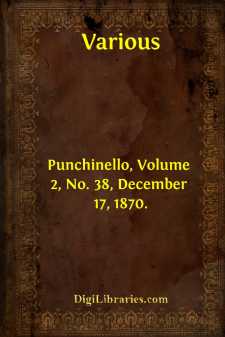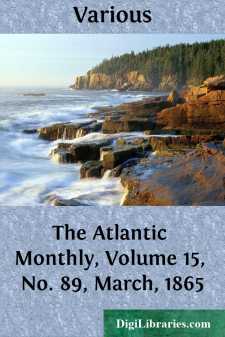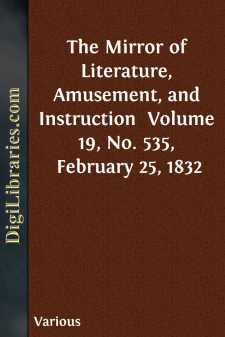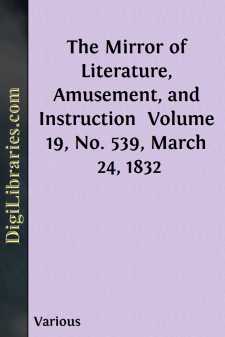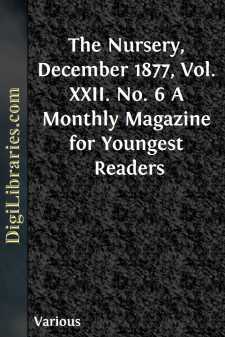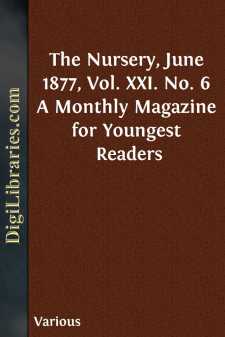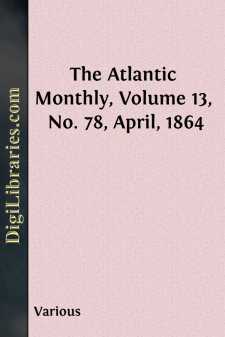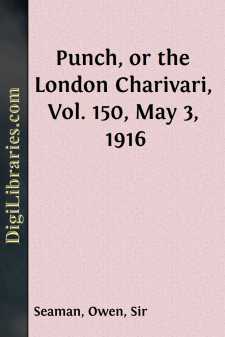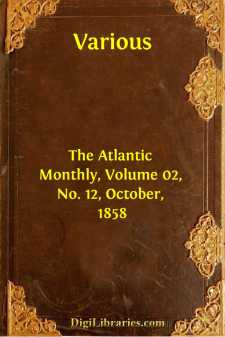Periodicals
- Art 27
- Children's periodicals 59
- Entertainment 5
- Food/Wine 2
- Games/Humor 455
- General 661
- Health 1
- History 53
- House/Home 1
- Regional 62
- Science/Nature 118
- Transportation 10
Periodicals Books
Sort by:
by:
Various
MAN AND WIVES. A TRAVESTY. By MOSE SKINNER. CHAPTER FIFTH. QUEER DOINGS AT THE HALF-WAY HOUSE. "Tell the minister," said ANN to TEDDY, "to come in. If I don't get a husband out of this somehow, I ain't smart. I'll just marry the man I've got here." ARCHIBALD sank down on the sofa, bathed in a cold perspiration. "Oh, don't" he groaned; "you...
more...
by:
Various
My story begins as a great many stories have begun within the last three years, and indeed as a great many have ended; for, when the hero is despatched, does not the romance come to a stop? In early May, two years ago, a young couple I wot of strolled homeward from an evening walk, a long ramble among the peaceful hills which inclosed their rustic home. Into these peaceful hills the young man had...
more...
by:
Various
ZOOLOGICAL GARDENS, REGENT'S PARK. THE POLAR BEAR. MONKEY CAGE. A visit to these Gardens is one of the most delightful of the rational recreations of the metropolis. The walk out is pleasant enough: though there is little rural beauty on the road, the creations of art assume a more agreeable appearance than in the city itself; and, with cottages, park-like grounds, and flourishing wood, the eye...
more...
by:
Various
WINDSOR CASTLE, (N.E.) Our sketchy tour of Windsor Castle has hitherto been told in visits far between, perhaps, if not few, for the interesting character of the whole fabric. The present Cut includes the North-east view, a picturesque if not important point. The reader will remember, if he has not enjoyed, the splendid terrace on the north; this is now continued on the eastern side. The fine tower at...
more...
by:
Various
THE MORNING AFTER THE PARTY.MARY (angrily). Tommy, you deceiver!You've turned a regular thiever:I've let the light in on your deeds,You needn't sneak away.You thought it mighty pleasantTo devour that dainty pheasant;Which cook and I for breakfast meantTo have this very day. TOM (calmly).Miss Mary, I assure youYou're entirely mistaken:I was finishing my supper—Don't call me...
more...
by:
Various
ARTHUR'S NEW SLOOP. OW, boys," said Uncle Martin, "if you were at sea in a vessel like this, what should you do when you saw a squall coming up?""I should take in all sail, and scud under bare poles," said Arthur. "But what if you did not want to be blown ashore?" "Then I should leave out the first reef, so as to catch as much wind as I could risk, and steer for the...
more...
by:
Various
FIGHTING FACTS FOR FOGIES. Young people are often charged with caring little for the past. The charge is just; and the young are right. If they care little for the past, then it is certain that it is in debt to them,—as for them the past cared nothing. It is wonderful, considering how children used to be treated, that the human race ever succeeded in getting established on earth. Humanity should have...
more...
by:
Owen Seaman
May 3, 1916. Sir Roger Casement, it appears, landed in Ireland from a collapsible boat. And by a strange coincidence his arrival synchronised with the outbreak of a collapsible rebellion. Hard soap can now be obtained in Germany only by those who purchase bread tickets. The soft variety cannot be obtained at all, the whole supply, it seems, having been commandeered by the Imperial Government for export...
more...
by:
Various
Half a dozen rivulets leap down the western declivity of the Rocky Mountains, and unite; four thousand miles away the mighty Missouri debouches into the Mexican Gulf as the result of that junction. Did the rivulets propose or plan the river? Not at all; but they knew, each, its private need to find a lower level; the universal law they obeyed accomplished the rest. So is it with the great human...
more...
by:
Owen Seaman
August 26, 1914. An eclipse of the sun took place on Friday last. It is supposed to have been an attempt on the part of the sun to prevent the Germans finding a place in it. South Africa has now declared with no uncertain voice that she intends to fight under the British Flag, and the Kaiser's vexation on realising that the money spent on a certain famous telegram was sheer waste is said to have...
more...


